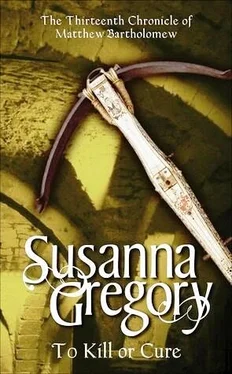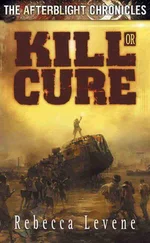‘You are right to be worried,’ said Carton. ‘The messenger also said the onlookers have taken sides, and your beadles are hard-pressed to keep them apart. You are both needed on Milne Street.’
Easter Sunday was a time of feasting and celebration, and even the town’s poorest inhabitants marked the occasion by decking themselves out in their best clothes and strolling along the town’s main thoroughfares. It was a time for visiting family and friends, for enjoying bright sunshine and street performers. Strictly speaking, entertainment was forbidden on such a holy day, but neither the University nor the town made any effort to enforce the rule, and the narrow lanes were full of singers, dancers, magicians, fire-eaters and jugglers. The streets echoed with rattling drums, trilling pipes and the babble of excited conversation.
It was not just townsmen who were making the best of a mild spring day and some free time. Students wearing the distinctive uniforms of their foundations were out in force. Normally, the presence of so many liveries would have resulted in brawls, as ancient grievances between Colleges and hostels were resurrected. This year, however, the scholars had laid aside their differences to concentrate on a common enemy: the town. The rent war was seen as an attempt to suppress their studium generale , and the more alarmist among them were braying that it was the greatest threat academia had yet faced. If the town won, they said, and rents were indeed trebled, other privileges would disappear, too – such as affordable ale, bread and fuel, the prices of which were also kept artificially low by the University Statutes. Michael did his best to control the rumours, but it was like trying to stem the flow of a river. The scholars believed they were under attack, and the uncompromising stance taken by the landlords was doing nothing to dispel the illusion.
The hostels were bearing the brunt of the dispute. Landlords declined to carry out essential repairs until their tenants agreed to the new terms, so students were forced to leave when conditions became intolerable. Alternatively, when leases expired, the owners refused to renew them, so scholars suddenly found themselves ousted from houses they had inhabited for years. Naturally, the University fined the landlords for their audacity, but the landlords were refusing to pay up – and the University was astonished to learn that it did not know how to make them.
‘Look at the way those lads from King’s Hall are glaring at the mason’s apprentices,’ panted Michael as he waddled along at Bartholomew’s side. The fat monk was not built for moving at speed. ‘They would dearly love to fight.’
Bartholomew nodded. ‘And the students of Rudd’s and Margaret’s hostels, who have hated each other for years, have joined forces to menace those pot-boys from the Angel.’
‘But they are still outnumbered,’ said Michael. He heaved a sigh of relief when the scholars backed down and moved away. Immediately, the pot-boys broke into a chorus of jeers and catcalls, but the students showed admirable restraint, perhaps because the Senior Proctor was watching.
He and Bartholomew, with Falmeresham and Carton in tow, hurried along Milne Street, a major thoroughfare named after the mills that thumped and creaked at its southernmost end. First, they passed Ovyng Hostel with its rotting timbers and dirty plaster, then the back of Gonville Hall, a small but wealthy institution that specialised in training lawyers. Then came Trinity Hall and Clare, both with high walls protecting them from the ravages of resentful townsmen – and the ravages of rival foundations. Beyond Clare lay the little church of St John Zachary, and in the distance were the thatched roofs and gables of the Carmelite Friary.
Sandwiched between the University’s property, mostly on the eastern side of the road, were the homes and shops of merchants. Elegant pargeting and glazed windows indicated that Cambridge was a thriving commercial centre, as well as a place of learning and education. Bartholomew’s brother-in-law, Oswald Stanmore, owned one of the grandest, although he preferred to live outside the town, using his Milne Street premises as a place of business. However, when Cambridge was uneasy he liked to be on hand to protect his assets, and he was in residence that day. He and his wife Edith – Bartholomew’s sister – were in the yard, handing out Easter treats to their apprentices. They waved as their kinsman raced past.
The accident had occurred outside Clare’s main gate, and had attracted a large crowd – scholars as well as the men who worked for the Milne Street traders. Michael’s beadles moved among them, but it was clear they were struggling to keep the peace. Bartholomew saw one student push a jeweller hard enough to make him stumble, then dart away when the fellow whipped around to reciprocate. The student’s cronies raised their hands to indicate they had not been responsible, but there was a jeering, gloating quality to the gesture that was designed to aggravate, not pacify.
‘I am glad you are here, Brother,’ said Beadle Meadowman, stepping forward to greet the man who paid his wages. ‘But Doctor Bartholomew’s services are no longer needed. Robin of Grantchester and the new healer are already here.’
‘What new healer?’ asked Bartholomew, startled.
It was Carton who replied. ‘He means Richard Arderne, who arrived on the first day of Lent.’
‘I am surprised you have not come across him, sir,’ added Falmeresham helpfully. ‘He did nothing for the first few weeks, then last Saturday he made his debut with some very public cures.’
‘Matt was busy on Saturday, trying to rectify that unhappy business Deynman precipitated,’ said Michael. ‘He did not have time to wander around and watch other medical men at work.’
Falmeresham rolled his eyes. ‘I had forgotten. Deynman misread the dosage on old Master Hanchach’s medicine, and Doctor Bartholomew was obliged to spend hours making sure the poor man did not die as a result.’
Bartholomew winced. Deynman was becoming a major liability, and he had been appalled to learn that the lad could not be trusted to follow even the most simple of instructions. It told him more than ever that Deynman should never be let loose on the general populace, and he lived in constant fear that the student would decide to abandon his training and go into practice without the qualification that was taking so long to acquire.
‘Arderne has been saying some very rude things about Surgeon Robin,’ said Carton, changing the subject when he saw the cloud pass across the physician’s face. ‘He says his methods are outmoded and dangerous, and that people would be wise to avoid him.’
‘It is true,’ said Falmeresham bluntly. ‘Robin is a menace, and everyone knows it.’
Robin of Grantchester had been in Cambridge for as long as anyone could remember, and held a surgical monopoly. Unfortunately, he was not very good at his trade, and a large number of his patients died. Some perished while he was wielding his filthy instruments, while others expired later, of the fevers that were an inevitability after encounters with Robin. He was summoned only by the desperate or the uninformed, although he was said to be a master at trimming beards.
Luckily for his own patients, Bartholomew was not averse to practising surgery himself, despite it being forbidden to him on two counts. Firstly, it was against Canon Law, and, as a member of the University, he had taken minor religious orders, so was bound by its decrees. Secondly, physicians were supposed to remain aloof from the messy business of cutting and sewing. He had learned, however, that people were more likely to survive if he performed the procedures himself, rather than asking Robin to do them. Therefore, he was pleased to learn that another healer was available for him to call upon, because although he did not mind plying the skills he had learned during his unorthodox training, he disliked the recriminations that often followed from his fellow physicians.
Читать дальше












